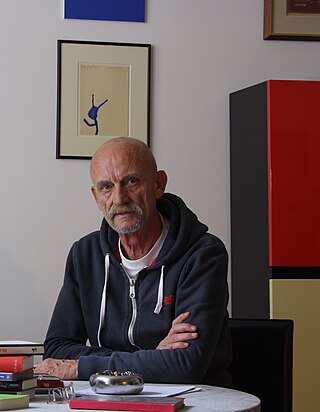Ernst Wilhelm Julius Bornemann, also known by his self-chosen anglicisation Ernest Borneman, was a German crime writer, filmmaker, anthropologist, ethnomusicologist, psychoanalyst, sexologist, communist agitator, jazz musician and critic.

Alexander Harbord Mitscherlich was a German psychiatrist and psychoanalyst.

Iwan Bloch, also known as Ivan Bloch, was a German dermatologist, and psychiatrist, psychoanalyst born in Delmenhorst, Grand Ducal Oldenburg, Germany, and often called the first sexologist.
The Berlin Psychoanalytic Institute was founded in 1920 to further the science of psychoanalysis in Berlin. Its founding members included Karl Abraham and Max Eitingon. The scientists at the institute furthered Sigmund Freud's work but also challenged many of his ideas.
Gerhard Scherhorn was a German Professor and economist.
Volkmar Sigusch was a German sexologist, physician and sociologist. From 1973 to 2006, he was the director of the Institut für Sexualwissenschaft at the clinic of Goethe University Frankfurt.
Gunter Schmidt is a German sexologist, psychotherapist and social psychologist. He was born in Berlin.

Martin Dannecker is a German sexologist and author.

August Aichhorn was an Austrian educator and psychoanalyst.

Günter de Bruyn was a German author.

Hope Bridges Adams Lehmann was the first female general practitioner and gynecologist in Munich, Germany.
Margarete Mitscherlich-Nielsen or the "Grande Dame of German Psychoanalysis" as she was often referred to as, was a German psychoanalyst who focused mainly on the themes of feminism, female sexuality, and the national psychology of post-war Germany.
Wolfgang Zapf was a German sociologist.

Rainer Krause is a German psychologist, psychoanalyst and researcher of human emotions.
Karin Flaake is a German sociologist and professor (retired) at the Carl von Ossietzky University Oldenburg. Her publications on the adolescence of young women and men are part of the literature of socio-psychologically oriented gender research. Another focus of her work is on the chances of changing gender relations in families.
Ilse Grubrich-Simitis (1936) is a German psychoanalyst. She works in private practice and as a training analyst at the Frankfurt Psychoanalytical Institute.
Vera King is a German sociologist and social psychologist. She has been Professor of Sociology and Social Psychology at Goethe University Frankfurt and Director of the Sigmund Freud Institute in Frankfurt am Main since 2016.
The Sigmund Freud Institute (SFI) is a research institute for psychoanalysis located in Frankfurt, Germany. It was established in 1960 as an institute and training center for psychoanalysis and psychosomatic medicine. Renamed in 1964, it is now called after Sigmund Freud, the founder of psychoanalysis. Since 1995, the institution has been dedicated entirely to research.
Beate West-Leuer is a German professor, psychotherapist, consultant and coach.
Walter Hollitscher was an Austrian philosopher, educator, psychoanalyst and journalist.
This page is based on this
Wikipedia article Text is available under the
CC BY-SA 4.0 license; additional terms may apply.
Images, videos and audio are available under their respective licenses.






